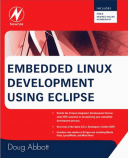Книга: Embedded Linux development using Eclipse
7.2.1 Extensions and Extension Points
7.2.1 Extensions and Extension Points
Fundamentally, extensions and extension points are how plug-ins communicate with the Eclipse platform and with each other. Conceptually, you can think of an extension point as a socket and an extension as a plug that mates with the socket.
Extension points define places where the Eclipse platform can be extended by plugging in additional functionality in the form of extensions. The current Eclipse platform exposes around 200 extension points in the following categories:
• Platform Runtime: Controls the global behavior of Eclipse itself. If you wanted to write an application based on the Eclipse platform, this is the place to start.
• Workspace: Contains extension points for managing projects, such as resource builders (build tools), markers, project life-cycle behavior, and team behavior.
• Platform Text: Facilities for extending editors.
• Workbench: Manages the user interface. This is the largest class of extension points and includes things like support for new views and editors, key bindings, drag-and-drop operations, and additional panels in the Preferences dialog.
• Team: Extension points to manage sharing of project resources, such as folders and files, among team members.
• Debug: Controls application launching as well as debugging. Includes extension points for both behavior and user interface functionality.
• Console: A set of three extension points for managing console views.
• User Assistance (in other words, Help): Facilities to extend the Eclipse Help engine. You can add new HTML help pages and cheat sheets, extend the table of contents, and access the search engine.
• Language Toolkit: Extension points that support refactoring.
• Other: Provides access to the underlying Ant infrastructure. Facilities include read-only content viewers and specialized search pages.
The Platform Plug-in Developer Guide in the Eclipse online documentation provides a thorough description of all the extension points and this is, in fact, the best place to get familiar with what the various extension points represent.
Extensions in turn provide the additional functionality that plugs into the extension points. This is what plug-ins generally do. They extend Eclipse functionality by “plugging in” to extension points.
- 10.1.6 Cancellation points
- 7.2.2 MANIFEST.MF and plugin.xml
- Разработка приложений баз данных InterBase на Borland Delphi
- Open Source Insight and Discussion
- Introduction to Microprocessors and Microcontrollers
- Chapter 6. Traversing of tables and chains
- Chapter 8. Saving and restoring large rule-sets
- Chapter 11. Iptables targets and jumps
- Chapter 5 Installing and Configuring VirtualCenter 2.0
- Chapter 16. Commercial products based on Linux, iptables and netfilter
- Appendix A. Detailed explanations of special commands
- Appendix B. Common problems and questions




